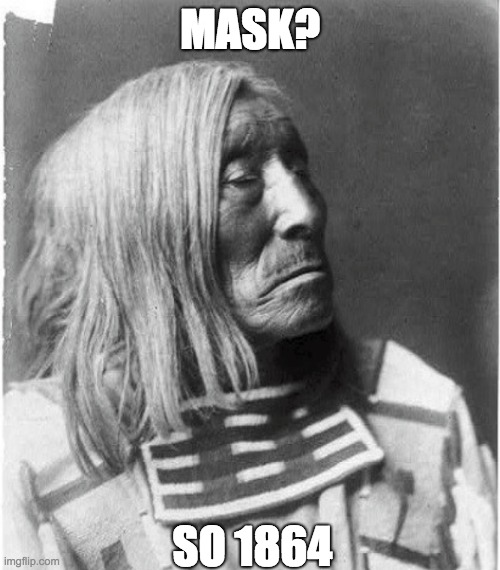
This is an example of a polarizing post that springboards off the meme of “Karens” (entitled White women who are passive-aggressively racist).

A screenshot of a meme on the Reddit page r/CovIdiots. When framed as “us against them,” Team Red is prompted to disregard mask advocates and take their cues from their fellow Republicans. (Again, it doesn’t matter if it’s true-what matters is the impact of the statement). Liberals, too, play into Trump’s hand by accusing COVID-19 deniers or skeptics of being “Trump death cult” members. Regardless of their motivations, taking cues from the leaders of one’s party is normal human behavior.


Still others may feel the sting of being considered “nonessential” in a capitalist economy that measures human worth in terms of productive output. While many may have selfish motivations (the “I need a haircut” signs come to mind), others may be experiencing financial catastrophe as their small businesses or workplaces are shut down. Trump has politicized the virus and modeled irresponsible behavior, leading many Republicans to believe that the proper way for Republicans in good standing to conduct themselves is to go maskless and demand that businesses reopen pronto. It’s understandable that people whose suffering stems more from the economic and social impacts of the shutdown than from the virus would be more likely to rebel against public health prescriptions than those grieving the loss of loved ones. Though the virus is now hitting red states and some rural areas hard, this was not the case in the early days of the pandemic. Acknowledgement that such contradictions are confusing and frustrating can go a long way.ģ. Now, social media is saturated with denunciations of Americans who refuse to wear a mask. Then, the evidence started stacking up: Masks reduced virus transmission by 75%, and countries that required masks were flattening the curve faster than those that didn’t. Mask-wearers, they said, were selfish, bad people who didn’t care that health care workers were facing an N-95 mask shortage. In the early days of the pandemic, my Facebook feed was filled with stern reprimands of those who were considering wearing a mask to protect themselves. If you are sanctimonious about your behavioral choices, people who don’t yet subscribe to them will be annoyed and disgusted, and they will not contemplate changing their ways. It doesn’t matter that heeding public health directives is objectively better than not doing so, just like it doesn’t matter that bringing cloth bags to the grocery store is objectively better for the environment than not. Like insults, casting blame or making moral judgments puts people on the defensive. Don’t be self-righteous, condescending, or judgmental. A screenshot of Chris Cuomo’s Instagram post.Ģ. People who don’t wear a masks are “dummies” to be ridiculed. They may very well have racist beliefs that lead them to devalue the lives of Black and brown virus victims, but the minute you call them a racist, they will stop listening, and you will have achieved nothing. It destroys trust, engenders hostility, and can make a person even less apt to wear a mask just to spite you. If you call someone a “Covidiot” or a “selfish racist,” what are the odds they will engage in a period of deep reflection before giving you a Facebook hug, thanking you for enlightening them, and asking where they can purchase a sweatshop-free mask? “rying to shame people into healthy behavior generally doesn’t work,” Harvard epidemiologist Julia Marcus says, “and actually can make things worse.”ĭrawing on the advice of public health experts and my own expertise in communication across lines of political difference, I offer the following advice for encouraging COVID-19 rebels to mask up: What not to doġ. “People don’t appreciate being told what to do by someone they don’t know,” explains Simon-Thomas, science director of the University of California, Berkeley’s Greater Good Science Center.īeing on the receiving end of unsolicited feedback can make people feel more entrenched and righteous about their behavior, especially if the feedback has a shaming quality. Neuroscientist Emiliana Simon-Thomas says that people often lash out vitriolically when they perceive others as being insufficiently self-sacrificing, but she says that doing so triggers resistance. But they are terrible at persuading skeptics to abide by public health precautions. The vast majority of social media memes I’ve seen are terrific at validating the behavior of people who are already diligently masking and social distancing. As the COVID-19 pandemic rages on, many people have found themselves serving as armchair epidemiologists and pundits, tracking the virus, projecting the future, and browbeating people who refuse to stay home or wear masks.

I’m not a public health educator, but I play one on social media.


 0 kommentar(er)
0 kommentar(er)
